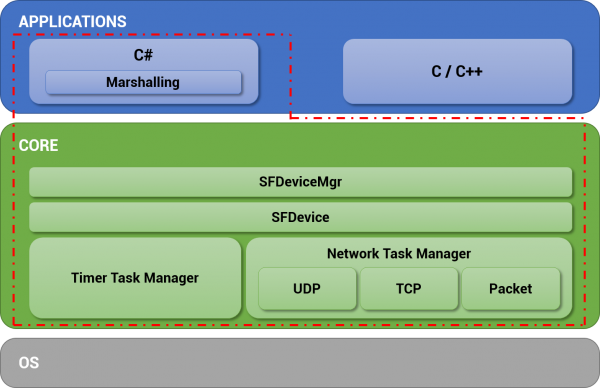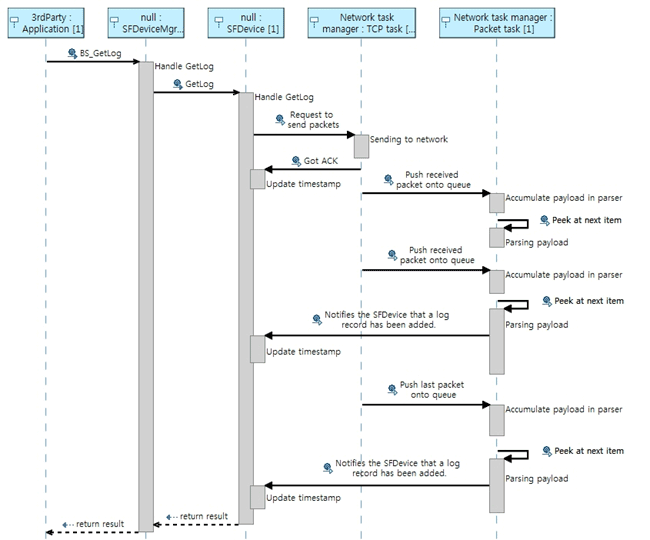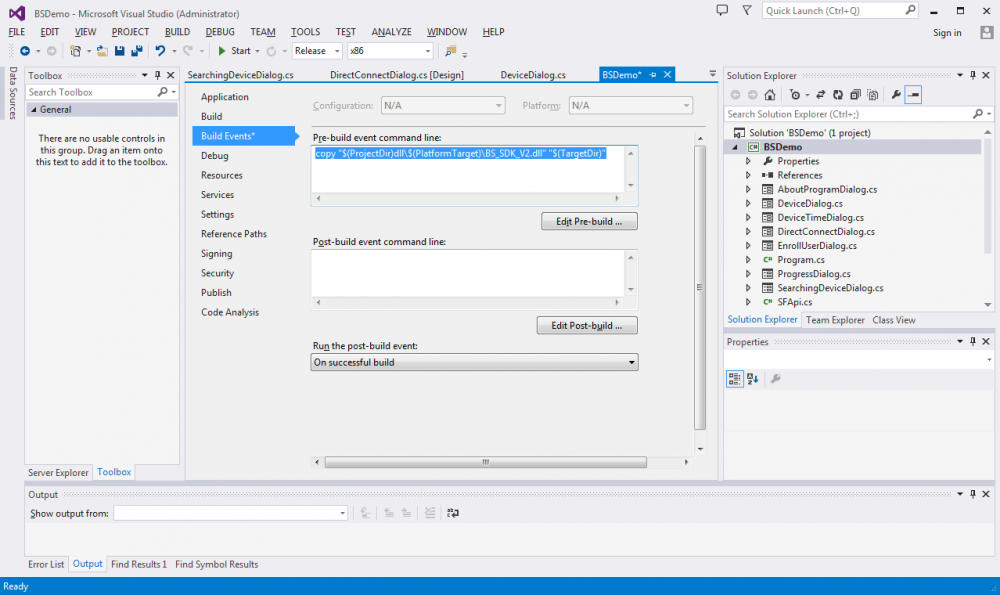Table of Contents
Getting Started
SDK Components
BioStar 2 Device SDK package is made of the following folders and files.
Framework

Workflow

Compatible device
You can use all devices which works with the BioStar 2.
Comparison with BioStar 1.x SDK
Consistency - Provides independent data structure and API
BioStar 1.x SDK had different structures and APIs for each type of devices. It was inconvenient, because making branching statements for every type was necessary to control several types of devices in one application.
if( m_DeviceType == BS_DEVICE_BIOENTRY_PLUS || m_DeviceType == BS_DEVICE_BIOENTRY_W || m_DeviceType == BS_DEVICE_BIOLITE || m_DeviceType == BS_DEVICE_XPASS || m_DeviceType == BS_DEVICE_XPASS_SLIM || m_DeviceType == BS_DEVICE_XPASS_SLIM2) { BEUserHdr userHdr; // Retrieve a user from the device BS_RET_CODE result = BS_GetUserBEPlus( m_Handle, m_UserID, &userHdr, m_TemplateData ); ... // Transfer the user to the device result = BS_EnrollUserBEPlus( m_Handle, &userHdr, m_TemplateData ); ... } else if( m_DeviceType == BS_DEVICE_BIOSTATION ) { BSUserHdrEx userHdr; BS_RET_CODE result = BS_GetUserEx( m_Handle, m_UserID, &userHdr, m_TemplateData ); ... result = BS_EnrollUserEx( m_Handle, &userHdr, m_TemplateData ); ... } else if( m_DeviceType == BS_DEVICE_DSTATION ) { DSUserHdr userHdr; ... BS_RET_CODE result = BS_GetUserDStation( m_Handle, m_UserID, &userHdr, m_TemplateData, m_FaceTemplate_DST ); ... result = BS_EnrollUserDStation( m_Handle, &userHdr, m_TemplateData, m_FaceTemplate_DST ); } else if( m_DeviceType == BS_DEVICE_XSTATION ) { XSUserHdr userHdr; ... BS_RET_CODE result = BS_GetUserXStation( m_Handle, m_UserID, &userHdr); ... result = BS_EnrollUserXStation( m_Handle, &userHdr ); } else if( m_DeviceType == BS_DEVICE_BIOSTATION2 ) { BS2UserHdr userHdr; ... BS_RET_CODE result = BS_GetUserBioStation2( m_Handle, m_UserID, &userHdr, m_TemplateData ); ... result = BS_EnrollUserBioStation2( m_Handle, &userHdr, m_TemplateData ); } else if( m_DeviceType == BS_DEVICE_FSTATION ) { FSUserHdr userHdr; ... BS_RET_CODE result = BS_GetUserFStation( m_Handle, m_UserID, &userHdr, faceTemplate ); ... result = BS_EnrollUserFStation( m_Handle, &userHdr, m_FaceTemplate_FST ); }
BioStar 2.x SDK uses one structure and one API for all types of devices. The developer doesn't have to use complicated branching statements, which allows users to use simple codes.
BS2UserBlob userBlob = (BS2UserBlob)Utils.AllocateStructure(typeof(BS2UserBlob)); ... int result = (BS2ErrorCode)API.BS2_EnrolUser(Program.sdkContext, deviceHandle.info.id, ref userBlob); ...
Convenience - Automatic management for network interface
BioStar 1.x SDK has to get a handle(socket descriptor) on the device when connecting to it. Notifies which device to control by using the handle(socket descriptor) achieved when calling an API.
int handle = 0; uint deviceID = 0; int deviceType = 0; result = BS_OpenSocket( "192.168.0.5", 1471, &handle ); result = BS_GetDeviceID(handle, &deviceID, &deviceType);
BioStar 2.x SDK does not make the developer control the handle(socket descriptor). When the device ID is sent as a parameter, the BioStar 2.x SDK framework automatically finds the relevant device and controls it.
const char* deviceAddress = "192.168.1.2"; uint16_t devicePort = 51211; uint32_t deviceId = 0; BS2SimpleDeviceInfo deviceInfo; int result = BS2_ConnectDeviceViaIP(context, deviceAddress, devicePort, &deviceId); int result = BS2_GetDeviceInfo(context, deviceId, &deviceInfo);
Isolation - Thread Safe
BioStar 1.x SDK needs to have a 'lock mechanism' put in place by a developer to avoid a single API being called from multiple threads at the same time.
BioStar 2.x SDK is designed to allow you to call a single API from multiple threads at the same time.
Maintenance - Flexible Development
BioStar 1.x SDK required adding or modifying the UI/logic of the application when a new type of device has been added. However, BioStar 2.x SDK provides each device's information in a unified structure. Therefore, modifying the existing application's UI/logic is not necessary when a new type of device is added.
For example, even though a new device supporting face recognition has been newly released, inconvenience of modifying the application can be avoided if the UI/logic has been designed to work based on the device's properties.
Building a Development Environment
Create a new project in Visual Studio
C/C++
Under construction
C#
- Select the library directory from the SDK package and copy it to the project directory.
- Modification of the project properties is required to use the right DLL for the platform.
Open the project properties page and enter as below onPre-build event command line of the Build Events.
| SDK Version | Platform | Input Information | |
|---|---|---|---|
| Before V2.8.2 | - | copy "$(ProjectDir)lib\$(PlatformTarget)\BS_SDK_V2.dll" "$(TargetDir)" copy "$(ProjectDir)lib\$(PlatformTarget)\libeay32.dll" "$(TargetDir)" // OpenSSL 1.0.2n copy "$(ProjectDir)lib\$(PlatformTarget)\libssl32.dll" "$(TargetDir)" // OpenSSL 1.0.2n copy "$(ProjectDir)lib\$(PlatformTarget)\ssleay32.dll" "$(TargetDir)" // OpenSSL 1.0.2n | |
| Later V2.8.2 | x86 | copy "$(ProjectDir)lib\$(PlatformTarget)\BS_SDK_V2.dll" "$(TargetDir)" copy "$(ProjectDir)lib\$(PlatformTarget)\libssl-1_1.dll" "$(TargetDir)" // OpenSSL 1.1.1i copy "$(ProjectDir)lib\$(PlatformTarget)\libcrypto-1_1.dll" "$(TargetDir)" // OpenSSL 1.1.1i | |
| Later V2.8.2 | x64 | copy "$(ProjectDir)lib\$(PlatformTarget)\BS_SDK_V2.dll" "$(TargetDir)" copy "$(ProjectDir)lib\$(PlatformTarget)\libssl-1_1-x64.dll" "$(TargetDir)" // OpenSSL 1.1.1i copy "$(ProjectDir)lib\$(PlatformTarget)\libcrypto-1_1-x64.dll" "$(TargetDir)"// OpenSSL 1.1.1i |
- Copy SFApi.cs, SFEnum.cs, SFStruct.cs from the SDK package example codes.
